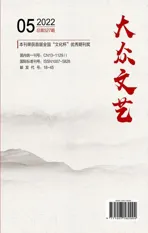The Ideology of Translator in Literary Translation
—— A case study of the translation of words in Gone with the Wind
2011-08-15王靖涵西安外事学院外国语学院陕西西安710077
王靖涵 (西安外事学院外国语学院 陕西西安 710077)
The Ideology of Translator in Literary Translation
—— A case study of the translation of words in Gone with the Wind
王靖涵 (西安外事学院外国语学院 陕西西安 710077)
Abstract:In this paper, Andre Lefevere’s theory about the ideological pressures on the translator and strategies that the translator adopts in translation is highlighted. It strives to analyze how translators’ ideology dictates their translations by comparing the translation of words in two Chinese versions of Gone with the Wind——Fu Donghua’s version of 1940s and Li Meihua’s version of 1990s respectively.
Key words: ideology; translation of words; Gone with the Wind;comparison
Introduction
Gone with the Wind is a well-known novel written by American woman writer Margaret Mitchell. It has been translated by translators of different ages. In the paper, Fu Donghua’s version of 1940 and Li Meihua’s version of 2000 are compared and analyzed under Andre Lefevere’s theory of ideology. Through the analysis,it shows that in 1940s, translators’ ideology was determined by the “war ideology”. However, in 1990’s, people’s ideology was greatly changed. The reasons for them to translate this novel are totally different from Fu Donghua’s. Because of different ideology of translators, they adopt distinct translation strategies in translating words of the original novel.
Lefevere’s Theory of Ideology
As the representative of cultural-based approaches to translation studies, Andre Lefevere argues that translation is a rewriting of an original text.Translators, as rewriters, are obviously influenced by the fact that they occupied a certain position with a certain institution. The image of a literary work as projected by a translation is determined basically by two factors----the translator’s ideology and the poetics dominant in the receiving literature at the time the translation is made.[1]For Lefevere, the most important consideration is “questions about the ideological pressures on the translator and strategies that the translator has for influencing the intellectual milieu.”[2]The poetics consideration refers to the dominant poetics in the TL culture. Together these two factors dominant the translation strategy and the solutions to problems concerned in translation.[3]However, in this paper, the ideological pressures on the translator in literary translation are stressed.
The Dominant Ideology of Two Chinese Versions
Gone with the Wind has been translated by the translators of all ages. It was first introduced to Chinese readers by Fu Donghua in the 1940s. Then several other versions were produced successively. This part deals with a comparison between Fu Donghua’s version of 1940, and Li Meihua’s version of 2000. The comparisons fall on the ideological constrains of 1940s and of 1990s respectively.
The dominant ideology in 1940s
During 1930s-1940s, China has undergone successive suffering and disturbance by war, first by the war against Japan and then by the civil war. Under such condition, people’s life was greatly affected and their security was threatened. The survival and the future of the country became the concerns of the multitude.Lots of people began to probe the way of getting rid of war sufferings and helping people rebuild the sense of security. Accordingly, a new ideology came into people’s mind that is now termed as “War ideology”.[4]This “War ideology” in 1937-1945 emphasized “to defend China from Japanese invasion” and “to fight for the survival of the country and its people”.
Comparison of the Translation of Words between Two Versions
From the analysis above we can see, Fu Donghua assumed the original novel as a popular fiction and a simple love story. So the aim of translation was to take in information rather than culture. In his version,there is an extensive employment of the strategy of domestication. Compared with Fu’s version, Li’s is more foreignized.
In translating characters’ names and geographical names, Fu translated them all into Chinese style. For example,Scarlett O’ Hara is translated into“郝思嘉” , Stuart and Brent Tarleton into “汤斯徒”,“汤伯伦”, Atlanta as“饿狼陀” , Charleston as “曹氏屯”.This kind of translation is easy to confuse readers. The whole story seems to take place somewhere in China and all characters are Chinese. In comparison with Fu’s version,Li’s version preserves the distinct foreign flavor of the original by taking the measure of foreignization in translation. For instance, the names “Stuart Tarleton”and “Brent Tarleton” are translated into “斯图尔特•塔尔顿”,“布伦特•塔尔顿” by Li Meihua.
Fu Donghua held the opinion that Gone with the Wind was a popular fiction that suits to the taste of general public and is read just for entertainment. Thus the language ought to be plain and familiar to ordinary readers. In his translation, a lot of colloquial words are used. While, Li Meihua avoids choosing those words and expressions in order to keep the elegant style of a classical masterpiece. For examples:
(1) And then the horse began snorting and rearing…(Mitchell,1980:8)
那马又重新喷起鼻孔竖起牌楼来(Fu, 1940:6)[7]
马又开始喷着鼻息又嘶又叫,还用右腿站了起来(Li,2000:8)[8]
(2)“Prissy is a likely little wench and so——”(Mitchell,1980:38)
“百利子这小妞儿可爱哪,所以就——”(Fu,1940:36)
“普里西是个是个漂亮的小女孩,所以——”(Li,2000:38)
(3)Drill always ended in the saloons of Jonesboro…(Mitchell,1980:22)
操练的最后一幕,照例是在钟氏坡的各家酒馆里(Fu,1940:23)
训练总是以再琼斯伯勒的沙龙聚会而告终(Li,2000:24)
(4)“I will do it or go into convent at Chrleston.”(Mitchell,1980:56)
我要这么做,他是好人。要不我就到曹氏屯做尼姑去。(Fu,1940:61)
我要这么做,要不然我就到查尔斯顿的女修道院去。(Li,2000:68)
Conclusion
In this paper, the author makes a comparison on the translation of words between two Chinese versions of the novel Gone with the Wind. Translation process does not take place in vacuum. Translators can not escape from the ideological constrains of the society they stay.Through the comparison of words in the two versions,it is found that because of dissimilar ideology of translator, Fu Donghua, and Li Meihua apply different strategies in translating words and their translations towards the same word are different. Therefore, when we analyze a translated version, the factor of ideology of translator has to be put into consideration in order to have a better understanding of the version.
Reference:
[1]王友贵.(2003). 意识形态与二十世纪中国翻译文学史(1899-1979). 《中国翻译》,24,12-15.
[2]朱云.(2005).从历史和文化的角度对《飘》的三个中译本的描述性对比研究. 优秀博硕士论文库,11-20. CNKI数据库.
3.Mitchell , Margaret.(1980). Gone with the Wind. London: Pan Books Ltd.
